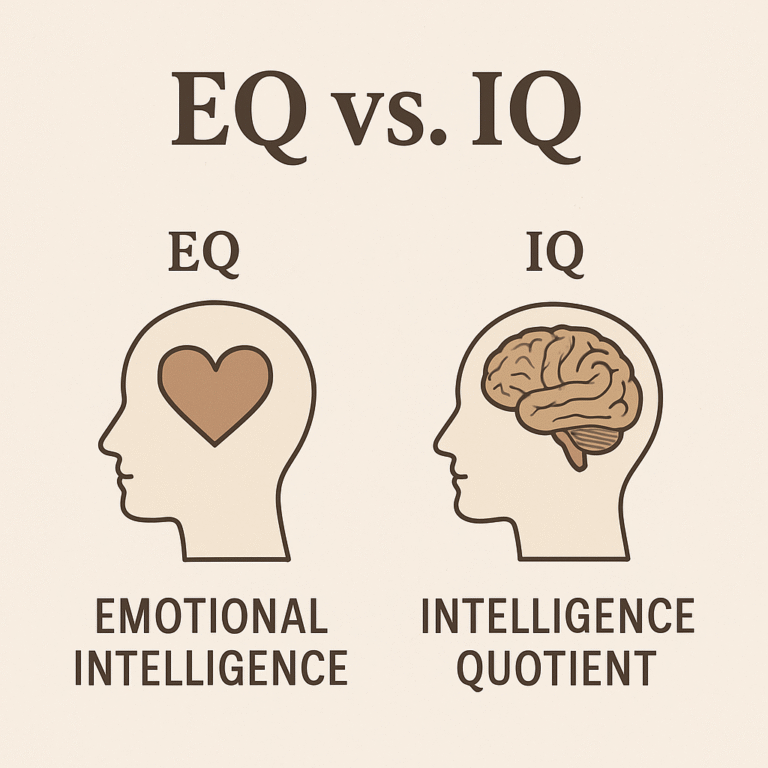3 Habits That Quietly Destroy Your Emotional Intelligence
You can spend years reading books on EQ, learning to “read the room,” or perfecting your communication skills. Still, if a few unnoticed habits remain in the background, you’ll constantly feel blocked in relationships, growth, and even self-respect.
Emotional intelligence doesn’t demand attention or try to win the argument. It doesn’t thrive on speed or performance either.
It’s quiet. Present. Deep.
And so are the things that damage it.
These three habits are subtle, common, and quietly destructive. Left unchecked, they erode your capacity to connect with others—and with yourself.
1. Ego Defense Mechanisms (The Emotional Escape Artists)
We all use them naturally. The question is: are you aware of yours?
Ego defense mechanisms are mental strategies we unconsciously deploy to avoid emotional discomfort. Think denial, rationalization, projection, or even sarcasm. They protect our self-image—but at a cost.
Here’s how they quietly affect EQ:
- They block honest self-awareness. If you’re always justifying your behavior, you never examine it or take responsibility, which halts personal growth.
- They distort your perception of others. Projection makes your judgments about others a reflection of your own unexamined fears.
- They prevent emotional ownership. Blaming, minimizing, or deflecting keeps responsibility—and therefore growth—out of reach.
Emotional intelligence begins where defense mechanisms end.
It starts when we stay with discomfort just long enough to learn from it.
EQ Shift: Instead of avoiding a tough feeling, ask: What is this reaction trying to protect?
2. Chronic Multitasking (The Disconnection Disguised as Productivity)
Multitasking isn’t a skill. It’s a habit of fragmentation.
From an emotional intelligence perspective, it’s one of the most damaging habits for modern professionals.
Here’s why:
- Multitasking weakens presence. EQ thrives on full attention—on hearing what’s not being said, reading between the lines, and noticing your inner reactions. You can’t do that while toggling between tabs.
- It lowers empathy. When your attention is divided, people feel it. They may not call it out, but they sense it—and disengage slowly.
- It creates internal chaos. Clarity, not speed, is the real enabler of emotionally intelligent decisions.
Being organized is not the same as being busy.
The more mentally decluttered you are, the more attuned and grounded you become.
EQ Shift: Replace multitasking with intentional task-shifting. Single-task with clarity, then move on with purpose. Presence is power.
Related: How to Continuously Improve Your Emotional Intelligence
3. Lack of Self-Reflection (The Silent EQ Killer)
If there’s one root cause of emotional immaturity, it’s this: not reflecting on your behavior.
This doesn’t mean overthinking. It means making space to examine:
- What you did
- What you didn’t do
- Why you reacted the way you did
- Who it impacted
- What your patterns reveal
Self-awareness is the foundation of emotional intelligence.
Yet so many people live reactively, never pausing to ask: What part of this was mine?
When you skip reflection:
- You externalize blame and shrink your emotional power.
- You repeat harmful patterns and call it bad luck.
- You miss opportunities for authentic connection—especially with yourself.
EQ Shift: Build a 5-minute reflection ritual. Ask yourself daily: What did I learn about myself today?
The more honest the answer, the higher your EQ.
Your Habits Shape Your Emotional Horizon
None of these habits makes you a “bad person.” They make you human.
But the cost of ignoring them is steep: disconnection, defensiveness, and emotional stagnation.
Emotional intelligence doesn’t grow from performance.
It grows from awareness, attention, and honesty.
Break these three habits, and you’ll start living a deeper version of yourself—one that’s calmer, wiser, and more connected to the people around you.









